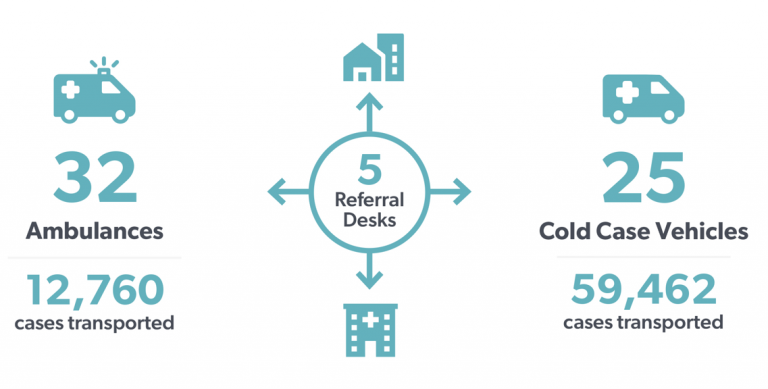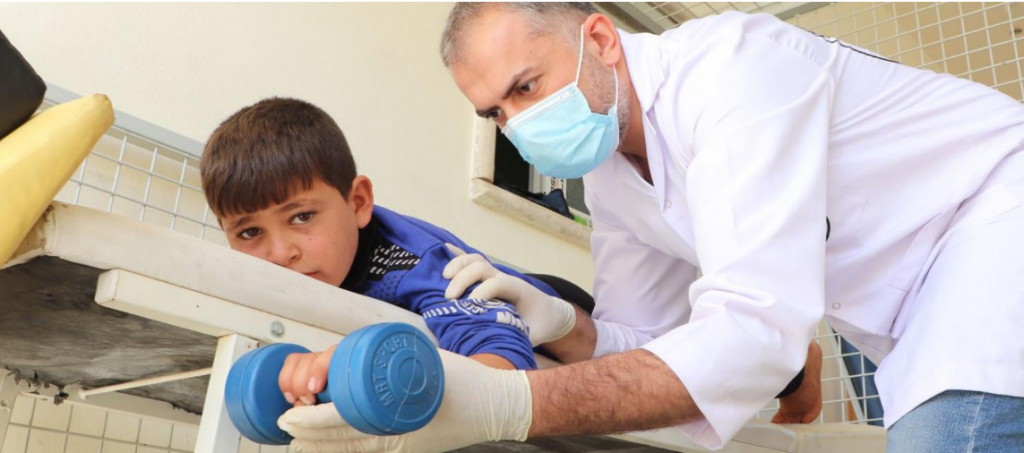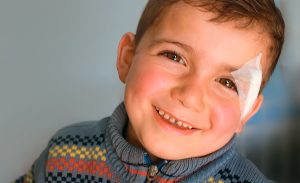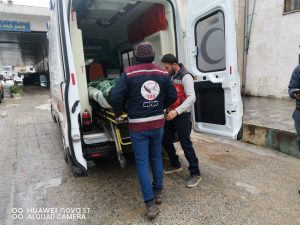
Healthcare Can’t Wait
Displaced communities in Syria are facing a hunger and health emergency. Help us give food, clean water, and medical assistance to displaced families in Syria who are living in dire…
DONATESRD has operated in the health sector since 2011 through a holistic and interdisciplinary approach aimed at addressing overall health and well-being. An integrated focus on public health through community health programs have been complementary to the multilevel health network in place. Health programs operate on the notion of a continuum of care. Without addressing health concerns on every level of the medical spectrum including primary, secondary and tertiary care, neglected conditions affect other components of health, and ultimately, the social fabric of society, as a healthy population is the cornerstone of a thriving society. With over 12.2 million’ people in need of health care in Syria, access to such services has never been more critical. The dangerous operational context of Syria—including attacks? to health care facilities and health care workers—and increasing health needs of the population as a result of protracted crisis, and as of 2020, the Covid-19 pandemic, means that services must address immediate and complex needs through integrated services across the health continuum.
SRD has operated in the health sector since 2011 through a holistic and interdisciplinary approach aimed at addressing overall health and well-being. An integrated focus on public health through community health programs have been complementary to the multilevel health network in place. Health programs operate on the notion of a continuum of care. Without addressing health concerns on every level of the medical spectrum including primary, secondary and tertiary care, neglected conditions affect other components of health, and ultimately, the social fabric of society, as a healthy population is the cornerstone of a thriving society. With over 12.2 million’ people in need of health care in Syria, access to such services has never been more critical. The dangerous operational context of Syria—including attacks? to health care facilities and health care workers—and increasing health needs of the population as a result of protracted crisis, and as of 2020, the Covid-19 pandemic, means that services must address immediate and complex needs through integrated services across the health continuum.

Mobile & Static Clinics
Montal Health Initiative
Maternity Hospital
General Hospital
Physical Therapy
Center
services provided
Dialysis
Facility
services provided
Tuberculosis(TB)
Center
patients treated
Immunization
administered
Providing emergency transport through a network of ambulances and trained paramedics ensures
that patients are able to rapidly reach facilities. This has proven essential in the Covid-19 response. Referral services provide link facilities that are able to receive such emergency patients along with transport of any cold-cases who lack access to transportation.
Providing emergency transport through a network of ambulances and trained paramedics ensures
that patients are able to rapidly reach facilities. This has proven essential in the Covid-19 response. Referral services provide link facilities that are able to receive such emergency patients along with transport of any cold-cases who lack access to transportation.


A tremendous focus is placed on preventive services for men, women, and children through fixed and mobile primary health care services for the prevention and management of acute and chronic conditions. These include outpatient delivery, immunizations, communicable and non-communicable disease management, community health, mental health, and infection prevention and control.

A tremendous focus is placed on preventive services for men, women, and children through fixed and mobile primary health care services for the prevention and management of acute and chronic conditions. These include outpatient delivery, immunizations, communicable and non-communicable disease management, community health, mental health, and infection prevention and control.
Hospitals continue to provide secondary and emergency services to patients, including life-saving surgeries and services for women who face complications during labor. Secondary and tertiary services including physical therapy and rehabilitation for the growing population that now lives with disabilities; tuberculosis treatment; and dialysis for patients with chronic kidney disease. A large focus is placed on physical therapy and rehabilitative services for Syrians whose impairments stem from development, chronic or conflict-related conditions.
Hospitals continue to provide secondary and emergency services to patients, including life-saving surgeries and services for women who face complications during labor. Secondary and tertiary services including physical therapy and rehabilitation for the growing population that now lives with disabilities; tuberculosis treatment; and dialysis for patients with chronic kidney disease. A large focus is placed on physical therapy and rehabilitative services for Syrians whose impairments stem from development, chronic or conflict-related conditions.

Displaced communities in Syria are facing a hunger and health emergency. Help us give food, clean water, and medical assistance to displaced families in Syria who are living in dire…
DONATEDisplaced communities in Syria are facing a hunger and health emergency.
Help us give food, clean water, and medical assistance to displaced families in Syria who are living in dire conditions.
Deadly attacks on healthcare facilities and the COVID-19 pandemic have intensified the population’s already grave health needs as the crisis goes through its grim tenth year.
With over 12 million people in need of healthcare, access to such services has never been more critical. Dire economic conditions and food insecurity have led to exponential rates of malnutrition and starvation, affecting 6.2 million children.
SRD is devoted to providing essential, life-saving health and nutrition services to displaced Syrians. By directly supporting SRD’s efforts, such as the following, your contribution will help families affected by ten years of crisis receive vital services:

The conflict in Syria has continued to force displaced families seeking protection and security southward to Jordan. Currently, over 1.4 million displaced Syrians in Jordan face poor living conditions. As…
DONATEThe conflict in Syria has continued to force displaced families seeking protection and security southward to Jordan. Currently, over 1.4 million displaced Syrians in Jordan face poor living conditions. As a result, the provision of medical aid to displaced families in Jordan is a priority to SRD.
We believe that medical care is essential, and we strive to alleviate the suffering of the underserved by providing and facilitating free and affordable healthcare services.
Syria Relief and Development has established several healthcare centers, one of which is SRD Clinic in Amman, Jordan, providing healthcare based on international health standards services to 500 beneficiaries each month using the latest medical technologies.
Medical services including pediatrics, primary healthcare, internal medicine and dental care are provided by experienced physicians and specialized medical staff, available throughout the week.
Other key referral services for specialized care include: Gynecology, Ophthalmology , Neurosurgery, and Neurology
There remains a tremendous need, and our work is only limited by our resources and volunteers. Syria Relief and Development needs your continued support to help us provide high quality medical care for Syrians in need.
Help support those who have already suffered so much today.

UPDATE: Thanks to your out pouring of support we've surpassed our first two goals, and have now increased our goal to $150,000. Two massive earthquakes, measuring 7.8 and 7.7 on…
DONATEUPDATE: Thanks to your out pouring of support we’ve surpassed our first two goals, and have now increased our goal to $150,000.
Two massive earthquakes, measuring 7.8 and 7.7 on the Richter scale have hit Northwest Syria and Turkey in the span of a few hours. The epicenter of the first was in Gaziantep, where SRD’s Turkey country office is based.
SRD’s first responders are on the ground, our 20 ambulances have been deployed to serve those critically injured. Several hospitals in the region have been impacted by the earthquake, including Jandaris hospital.
As communities who have been responding to the crisis are now affected, we need your support to continue delivering life-saving services.
Your donations will support medical care, fuel for our ambulances, shelter, and food desperately needed in the area.
Please donate today.

Displaced communities in Syria are facing a hunger and health emergency. Help us give food, clean water, and medical assistance to displaced families in Syria who are living in dire…
Donate NowDisplaced communities in Syria are facing a hunger and health emergency.
Help us give food, clean water, and medical assistance to displaced families in Syria who are living in dire conditions.
Deadly attacks on healthcare facilities and the COVID-19 pandemic have intensified the population’s already grave health needs as the crisis goes through its grim tenth year.
With over 12 million people in need of healthcare, access to such services has never been more critical. Dire economic conditions and food insecurity have led to exponential rates of malnutrition and starvation, affecting 6.2 million children.
SRD is devoted to providing essential, life-saving health and nutrition services to displaced Syrians. By directly supporting SRD’s efforts, such as the following, your contribution will help families affected by ten years of crisis receive vital services:

The conflict in Syria has continued to force displaced families seeking protection and security southward to Jordan. Currently, over 1.4 million displaced Syrians in Jordan face poor living conditions. As…
Donate NowThe conflict in Syria has continued to force displaced families seeking protection and security southward to Jordan. Currently, over 1.4 million displaced Syrians in Jordan face poor living conditions. As a result, the provision of medical aid to displaced families in Jordan is a priority to SRD.
We believe that medical care is essential, and we strive to alleviate the suffering of the underserved by providing and facilitating free and affordable healthcare services.
Syria Relief and Development has established several healthcare centers, one of which is SRD Clinic in Amman, Jordan, providing healthcare based on international health standards services to 500 beneficiaries each month using the latest medical technologies.
Medical services including pediatrics, primary healthcare, internal medicine and dental care are provided by experienced physicians and specialized medical staff, available throughout the week.
Other key referral services for specialized care include: Gynecology, Ophthalmology , Neurosurgery, and Neurology
There remains a tremendous need, and our work is only limited by our resources and volunteers. Syria Relief and Development needs your continued support to help us provide high quality medical care for Syrians in need.
Help support those who have already suffered so much today.

UPDATE: Thanks to your out pouring of support we've surpassed our first two goals, and have now increased our goal to $150,000. Two massive earthquakes, measuring 7.8 and 7.7 on…
Donate NowUPDATE: Thanks to your out pouring of support we’ve surpassed our first two goals, and have now increased our goal to $150,000.
Two massive earthquakes, measuring 7.8 and 7.7 on the Richter scale have hit Northwest Syria and Turkey in the span of a few hours. The epicenter of the first was in Gaziantep, where SRD’s Turkey country office is based.
SRD’s first responders are on the ground, our 20 ambulances have been deployed to serve those critically injured. Several hospitals in the region have been impacted by the earthquake, including Jandaris hospital.
As communities who have been responding to the crisis are now affected, we need your support to continue delivering life-saving services.
Your donations will support medical care, fuel for our ambulances, shelter, and food desperately needed in the area.
Please donate today.